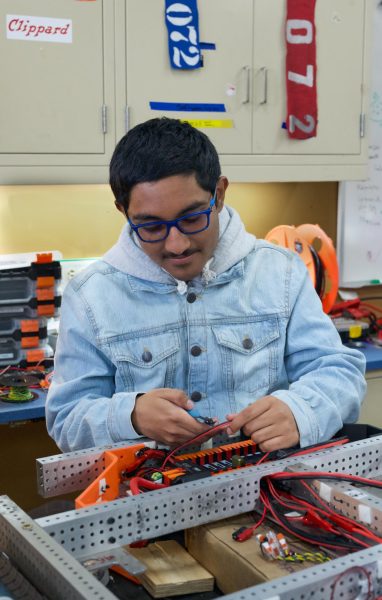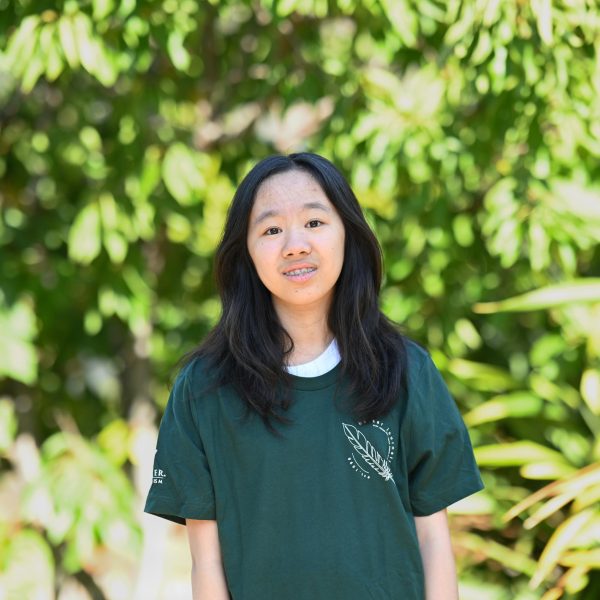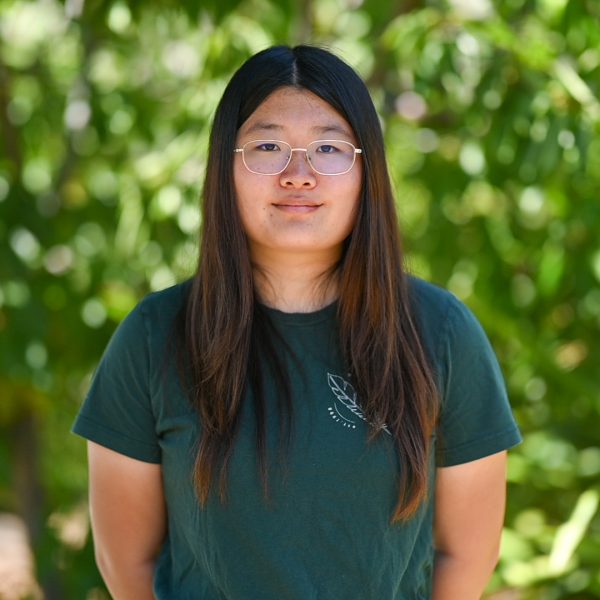
The tension in the pits at the Capital City Classic offseason competition is palpable, brimming with excitement and anxiety. Team 1072’s robot has just been sent off for a match, and every member of the team can sense the air of nervousness mixed with optimism that the robot will perform well. Electrical director senior Agastya Ravuri stares attentively at the monitor, knowing it will be his responsibility to fix the robot if the electrical components malfunction.
“Our design this year was not ideal,” Agastya said. “There were a lot of problems with routing wires and just having a lot of complexity. There were a lot of single points of failure. So every match, there’s a pretty high likelihood that something would go wrong. But that also meant that everyone, including me, gained a lot of experience with fixing these kinds of issues.”
Agastya’s journey with robotics started in his sophomore year, inspired by his own interests in the physical sciences and his brother’s regrets about not joining. In his junior year, Agastya became one of the electrical leads, and in senior year, electrical director. Last year, the previous electrical director left at the beginning of the build season, prompting Agastya, along with another lead, to take responsibility of the electrical subteam.
“It was both stressful and a good experience to learn,” Agastya said. “It’s the same situation as when you grow up and you don’t have your parents to rely on anymore. We’re now the ones who are on top and have to make decisions.”
As he entered new leadership positions, Agastya familiarized himself with repairing the robot when it broke down, strengthening his ability to work under pressure. During this year’s Capital City Classic competition, Agastya played a major role in diagnosing the electrical problems with the robot.
“You’re supposed to make sure that doesn’t happen,” Agastya said. “But the fact is, it does happen, and it’s stressful when it breaks. First, you don’t know what’s happening. You have a fear of the unknown. What if I can never actually fix this? And then you go on, do your debugging, and then once you find out actually what the problem is, you realize that there’s a path forward that you can take.”
Repairing the robot also revitalizes Agastya’s confidence in his technical skills. When the robot’s gyroscope persistently zeroed when it was not supposed to, Agastya managed to fix the issue with the power flickering. Despite moments of uncertainty, he perseveres through these challenges and solves the problem.
“There’s always the chance that something will break again,” Agastya said. “It’s very high. So, you have a cautious optimism towards the next match, and then either it breaks, and then it’s dashed your hope. Or, it works, and you feel on top of the world, like you can do anything. When you’re trying to fix it, you’re filled with a lot of doubt of if you’re ever going to fix it, and if you’re even qualified to do that. But then when it works, you can feel a lot better about yourself.”
Aside from fixing electrical problems, Agastya also instructed incoming frosh in Harker Robotics’ summer camp. Senior Atharv Goel, a close friend and the Technical President of Robotics, appreciates Agastya’s dedication in effectively teaching younger members, which led to the electrical summer camp being especially successful this year.
“Agastya’s really hit that good balance between both keeping people entertained and also teaching them actual valuable skills,” Atharv said. “Some previous directors for electrical were often a little too casual, so it might be that a lot of people stay, but at the expense that people don’t know what’s happening, or don’t know how to do electrical work. You don’t just need to know how everything works, but you need to be able to know how people work.”
In his sophomore year, Agastya joined jazz band to play trumpet, which he first started in sixth grade. He enjoys the tight-knit community of band, which has increased his self-confidence and willingness to take lead parts. Similar to robotics, Agastya takes initative to discuss with his section on potential improvements, successes and pitfalls. Last year, he played two solos in “Papa’s Got a Brand New Bag,” more than anyone else at the time, however it takes effort to craft a piece in a short amount of time.
“One of the biggest struggles for me is soloing,” Agastya said. “That’s a big part of jazz. You have to come up with a solo on the spot by listening to the chords in the background. You have to pay attention to what the other people are doing. You have to listen to them and incorporate that into what you’re doing. Even though it’s called a solo, it’s really more of a team thing.”
Math teacher Anu Aiyer notices Agastya speaking up more often in Information Theory, interacting with other students and observing relationships between concepts. When the class was discussing error-correcting codes and the mathematics behind them, she could see that Agastya was making an effort to figure out the connection.
“He’s always very forthcoming in terms of explaining things, and at the same time challenging somebody else’s thoughts and reasoning,” Dr. Aiyer said. “It’s clear he enjoys that kind of environment where you are pushing each other to do your best.”
Close friend senior Jason Shim admires Agastya’s humorous, authentic and logical disposition, which anchors their friend group. Jason met Agastya during the pandemic, when Agastya created the Utter Eggman group chat, now a thriving friend group of more than ten people. He appreciates Agastya’s efforts in bonding a tight-knit group together, creating long lasting friendships no matter the circumstances.
“It’s ironic because you usually expect to be separated from so many people during a pandemic,” Jason said. “But it’s a testament to how Agastya has this ability to build communities around him. We wouldn’t have found each other if not for Agastya. That’s a hot take, but he is the original Eggman, and I think the most utter of us all.”


















![“[Building nerf blasters] became this outlet of creativity for me that hasn't been matched by anything else. The process [of] making a build complete to your desire is such a painstakingly difficult process, but I've had to learn from [the skills needed from] soldering to proper painting. There's so many different options for everything, if you think about it, it exists. The best part is [that] if it doesn't exist, you can build it yourself," Ishaan Parate said.](https://harkeraquila.com/wp-content/uploads/2022/08/DSC_8149-900x604.jpg)




![“When I came into high school, I was ready to be a follower. But DECA was a game changer for me. It helped me overcome my fear of public speaking, and it's played such a major role in who I've become today. To be able to successfully lead a chapter of 150 students, an officer team and be one of the upperclassmen I once really admired is something I'm [really] proud of,” Anvitha Tummala ('21) said.](https://harkeraquila.com/wp-content/uploads/2021/07/Screen-Shot-2021-07-25-at-9.50.05-AM-900x594.png)







![“I think getting up in the morning and having a sense of purpose [is exciting]. I think without a certain amount of drive, life is kind of obsolete and mundane, and I think having that every single day is what makes each day unique and kind of makes life exciting,” Neymika Jain (12) said.](https://harkeraquila.com/wp-content/uploads/2017/06/Screen-Shot-2017-06-03-at-4.54.16-PM.png)








![“My slogan is ‘slow feet, don’t eat, and I’m hungry.’ You need to run fast to get where you are–you aren't going to get those championships if you aren't fast,” Angel Cervantes (12) said. “I want to do well in school on my tests and in track and win championships for my team. I live by that, [and] I can do that anywhere: in the classroom or on the field.”](https://harkeraquila.com/wp-content/uploads/2018/06/DSC5146-900x601.jpg)
![“[Volleyball has] taught me how to fall correctly, and another thing it taught is that you don’t have to be the best at something to be good at it. If you just hit the ball in a smart way, then it still scores points and you’re good at it. You could be a background player and still make a much bigger impact on the team than you would think,” Anya Gert (’20) said.](https://harkeraquila.com/wp-content/uploads/2020/06/AnnaGert_JinTuan_HoHPhotoEdited-600x900.jpeg)

![“I'm not nearly there yet, but [my confidence has] definitely been getting better since I was pretty shy and timid coming into Harker my freshman year. I know that there's a lot of people that are really confident in what they do, and I really admire them. Everyone's so driven and that has really pushed me to kind of try to find my own place in high school and be more confident,” Alyssa Huang (’20) said.](https://harkeraquila.com/wp-content/uploads/2020/06/AlyssaHuang_EmilyChen_HoHPhoto-900x749.jpeg)




